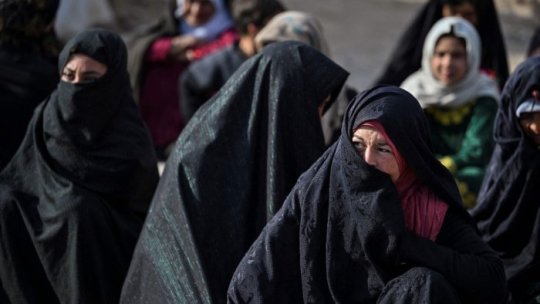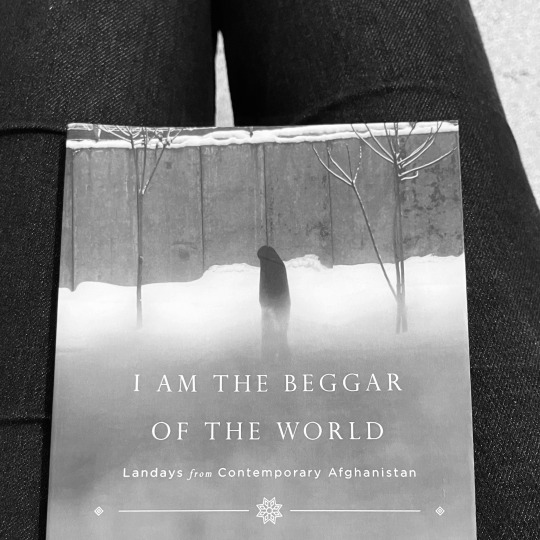#afghanistan women
Explore tagged Tumblr posts
Text
I hate being a woman; as the world goes on, all I want to do is rip my breast and ovaries from my flesh and live as a thing so I may finally be safe.
#election 2024#donald trump#kamala harris#abortion#women#protect women#Afghanistan women#feminism#radical feminism#human rights#violence against women#femicide#sex based oppression#women rights#free speech#sexism#female rage#fuck the patriarchy#current events#this is the beginning of the hunger games#dystopia#4b movement#i'm not eve American but I'm terrifed.#women in afghan#women across the world#palestinian genocide#support palestine#Nigerian women
10 notes
·
View notes
Text
Married at 10, abused and forced to flee without her children: an Afghan woman on life under the Taliban
4 notes
·
View notes
Text

2 notes
·
View notes
Text
Divorced Afghanistan women forced to return to abusive ex-husbands
When Taliban forces swept into power in 2021, her husband claimed he had been forced into a divorce and commanders ordered her back to his clutches.

KABUL: Abused for years by her ex-husband who broke all of her teeth, Marwa has retreated into hiding with her eight children after Taliban commanders tore up her divorce.
Marwa was one of a small number of women who, under the previous US-backed government, were granted a legal separation in Afghanistan, where women have next to no rights and domestic abuse is endemic.
When Taliban forces swept into power in 2021, her husband claimed he had been forced into a divorce and commanders ordered her back to his clutches.
"My daughters and I cried a lot that day," Marwa, 40, whose name has been changed for her own protection, told AFP.
"I said to myself, 'Oh God, the devil has returned'."
The Taliban government adheres to an austere interpretation of Islam and has imposed severe restrictions on women's lives that the United Nations called "gender-based apartheid".
Lawyers told AFP that several women have reported being dragged back into abusive marriages after Taliban commanders annulled their divorces.
For months Marwa endured a new round of beatings, locked away in the house, with her hands broken and fingers cracked.
"There were days when I was unconscious, and my daughters would feed me," she said.
"He used to pull my hair so hard that I became partly bald. He beat me so much that all my teeth have broken."
Gathering the strength to leave, she fled hundreds of kilometres (miles) to a relative's house with her six daughters and two sons, who have all assumed fictitious names.
"My children say, 'Mother, it's okay if we are starving. At least we have got rid of the abuse'," said Marwa, sitting on the cracked floor of her bare home, clasping a string of prayer beads.
"Nobody knows us here, not even our neighbours," she said, fearing her husband would discover her.
'Islam permits divorce' In Afghanistan nine in 10 women will experience physical, sexual or psychological violence from their partner, according to the UN's mission in the country.
Divorce, however, is often more taboo than the abuse itself and the culture remains unforgiving to women who part with their husbands.
Under the previous US-backed government, divorce rates were steadily rising in some cities, where the small gains in women's rights were largely limited to education and employment.
Women once blamed their fate for whatever happened to them, said Nazifa, a lawyer who successfully handled around 100 divorce cases for abused women but is no longer permitted to work in Taliban-ruled Afghanistan.
As awareness grew, women realised that separating from abusive husbands was possible.
"When there is no harmony left in a husband and wife relationship, even Islam permits a divorce," explained Nazifa, who only wanted to give her first name.
Under the ousted regime, special family courts with women judges and lawyers were established to hear such cases, but the Taliban authorities have made their new justice system an all-male affair.
Nazifa told AFP that five of her former clients have reported being in the same situation as Marwa.
Another lawyer, who did not want to be identified, told AFP she recently witnessed a court case where a woman was fighting against being forcefully reunited with her ex-husband.
She added that divorces under the Taliban government are limited to when a husband was a classified drug addict or has left the country.
"But in cases of domestic violence or when a husband does not agree to a divorce, then the court is not granting them," she said.
A nationwide network of shelters and services that once supported women has almost entirely collapsed, while the Ministry of Women's Affairs and the Human Rights Commission have been erased.
'Knock on the door'
Sana was 15 when she married her cousin, 10 years older than her.
"He would beat me if our baby cried or the food was not good," she said as she prepared tea on a gas stove at a home where she has been living in secret.
"He used to say that a woman does not have the right to talk."
With the help of a free legal service project, she won a divorce from her husband in court -- but her relief was shattered when Taliban commanders came knocking.
Threatened with losing custody of her four daughters, she returned to her ex-husband who by then had also married another woman.
She escaped after he announced the engagement of her daughters to Taliban members.
"My daughters said, 'Mother, we will commit suicide'," Sana said.
She was able to gather some money and escape with her children, and with the help of a relative found a one-room house, furnished only with a gas stove and some cushions for sleeping.
"Whenever there's a knock on the door, I fear that he's found me and come to take the kids away."
Ordeal for children
A Taliban official told AFP the authorities would look into such cases where previously divorced women were being forced to return to their ex-husbands.
"If we receive such complaints, we will investigate them according to sharia," said Inayatullah, spokesman for the Taliban supreme court, who like many Afghans goes by one name.
When asked whether the Taliban regime would acknowledge divorces granted under the previous government, he said: "This is an important and complex issue."
"The Dar al-Ifta is looking into it. When it arrives at a uniform decision, then we will see," he said, referring to a court-affiliated institution that issues rulings on sharia.
For Marwa and her daughters, who survive by sewing clothes, the trauma has left deep psychological wounds.
"I'm afraid I won't be able to get them married," said Marwa, looking at her daughters.
"They tell me, 'Mother, watching how bad your life has been, we hate the word husband'."
13 notes
·
View notes
Text
Taliban reject court request to arrest senior officials for persecuting Afghan women, girls
The Taliban rejected a court’s request to arrest two of their top officials for persecuting women, accusing the court of baseless charges and unworthy behaviour, according to AP News.
The International Criminal Court (ICC) chief prosecutor Karim Khan announced on Thursday that he had requested arrest warrants for two senior Taliban officials, including leader Hibatullah Akhundzada.
Since the Taliban regained control of the country in 2021, it barred women from working, from attending most public places and from education beyond the sixth grade. The Taliban Foreign Ministry said the ICC had turned a blind eye to decades of war and crimes against humanity committed by foreign forces and their allies.
This misbehavior further destroys the weak credibility of the said structure [ICC] and makes its status and position at the international level completely meaningless.
The Ministry warned the court against imposing its interpretation of human rights and ignoring the religious and national values of other countries. However, the Afghan Women’s Movement welcomed the court’s decision.
We consider this achievement a symbol of the strength and will of Afghan women and believe this step will start a new chapter of accountability and justice in the country.
A spokesman for the former Afghan administration, Mohammad Halim Fidai, said the Taliban leadership was likely to use the decision to prove its resilience to global pressure.
They may tell their followers that their beliefs are so powerful they have provoked the collective opposition of global powers. This decision could inadvertently serve as a badge of honor or credibility for them.
Afghanistan was the only country in the world that openly prohibits women and girls from receiving education at all levels, said the head of the United Nations Assistance Mission in Afghanistan (UNAMA), Roza Otunbayeva.
Read more HERE

#world news#news#world politics#afghan#afghanistan#afghanistan news#afghanistan withdrawal#afghanistan women#afghanistan war#taliban#women#women rights
0 notes
Text
There really is no better example of the racism of low expectations when certain far leftists criticise condemnation of the fucking Taliban as “peak white liberal feminism.” Women and girls in Afghanistan are being systematically removed from public life, denied the right to education, freedom of movement, of dress, even the right to speak in public or to each other. Animals have more rights than women under the Taliban.
And then you have these arseholes saying it’s imposing Western cultural mores on non Western societies to care about the welfare of these women, as if Afghan men couldn’t possibly be expected to know how to treat women like fucking human beings and they have the audacity to hold themselves up as “anti racist.” You’ve clearly shown what an incredibly low opinion you actually have of non white and non Western cultures if you think the situation in Afghanistan is remotely normal or indicative.
It’s absolutely putrid.
2K notes
·
View notes
Text

Afghan Miku 💖
#brazillian miku#hatsune miku#vocaloid miku#miku fanart#vocaloid#zozo art#afghan women#afghanistan#afghan attire
3K notes
·
View notes
Text


988 notes
·
View notes
Text
My experience and personal view on veiling as someone who grew up under a Burqa
When I was born, my father didn’t want me because I was a girl. When a girl is born, she isn’t cherished like a boy. Your life is received as a deadweight (note: I’m not saying this is something that happens every single time, just most of them) and a disappointment by the family. When your first breath comes in, the honor is on your shoulders.
My parents were so disappointed they gave me up to my aunt and uncle until I was one year old. When I was three, my father tried to sell/promise me into marriage. My grandmother, his mother, was the one who intervened and stopped him from doing it.
As I grew up, I noticed clear differences between me and girls from less conservative families, but everything was relatively normal until I hit nine years old. When it happened, I suddenly stopped traveling with my parents, stopped being able to leave the curtains open, couldn’t wear the clothes I used to wear even though I was still a child… as I grew older and older, the restrictions increased as my uncle and my father said I was becoming a beautiful woman and “I would be a problem for their family”.
Then, when I noticed, I wasn’t allowed to appear on windows, get packages from the mailman, go out in the yard, have a phone, stay alone in my room, talk to men (even if it was something as trivial as buying groceries), going out alone, needing to looking down when men walk past you, stay in your room when there’s visitors and don’t make a noise so they can’t hear you, not speak too loudly either, not share your name… the list is endless.
And, when you grow up inside a such conservative, traditional and religious family, your only future is disappearing. Along with having no voice and no face, servitude is as inescapable as death.

When you’re under a piece of cloth, you become faceless, you have no identity of your own. Outside the house, you’re a ghost. Inside the house, you’re a servant. You have no choice over yourself. This is your identity, a servant ghost who’s screams people pretend not to hear.
To a certain level, when you try to reflect on it, the veiling can be comforting. Being invisible can be comforting, no one sees you, you don’t need to worry about a thing. You can hide all your thoughts and most shameful actions from the daylight and no one is going to find out about them. But, when you are under the veil, your identity becomes something only you know about. To the rest of the world, you don’t exist, you’re not human. The veil will slowly dehumanize you, you will start fading away and there’s nothing you can do about it because how can someone attribute a face to a piece of fabric with a mesh on eye level?
And don’t fool yourself, the longer you keep your veil on, the harder the expectations will be. You may only need to cover now, but in some time, they will ask you why are your toes showing and why are you not hiding your hands behind the veil too, and why are you even outside your house? You should be home, protecting your family’s honor, you’re disgracing your family, go home.
And you may think “I’m invisible to the outside world but in my house I’m irreplaceable”, are you? How irreplaceable will you be when a younger, better wife comes in and the only safety you may have is the idea that your children will grow up to take care of you? How would someone possibly feel bad for you when you are nothing but a black trashbag? If you become a beggar, how will they see the suffering on your face if it will be covered and hidden away from the world?
I can’t be hypocritical and say that I don’t feel a sense of security under the veil, but it’s a false sense of security. When the time for your death comes, you won’t have your name on your grave, you won’t have a face. All you will ever have been is a servant, invisible to the outside world, with no God above to wonder “what about her?”. How dear are you inside those walls?

#radblr#free afghan women#afghan#afghanistan#pashtun#radical feminist safe#radfemblr#radical feminism#radical feminist community#radical feminists do interact#radical feminists do touch#radical feminists please interact#radical feminists please touch#radical feminst#radfeminism#trans exclusionary radical feminist#radical misandrist#fertility is a women issue#pregnancy iss a women issue#women’s rights#womens liberation#women liberation#violence against women#women#violence against girls#male violence#burqa#anti hijab#hijab#anti islam
1K notes
·
View notes
Text
#beautiful women#words of truth#true words#words to live by#elica le bon#israel#truth#hamas terrorism#free palestine from hamas#protect the women of afghanistan#protect girls sports#protect the school girls of iran#protect the children of afghanistan#protect girls#stand for the women and girls of iran#stand for the women of the muslim world
510 notes
·
View notes
Text
The Handmaid's Tale is not a dystopian fiction, it's a reality for women in Afghanistan:


#it upsets me that so little people are talking about it#afghanistan#feminism#human rights#women's rights#feminist
498 notes
·
View notes
Text
If your feminism doesn't include Iranian and Afghan women, then you're not a feminist.
If your feminism doesn't include women suffering in highly patriarchial societies, then you're not a feminist.
If your feminism doesn't include honour killing victims, then you're not a feminist.
If your feminism doesn't include women suffering at the hands of a zealot religious ideology, then you're not a feminist.
If you support women who want to wear the hijab, but don't support women who don't want to wear it, then you're a morally corrupted person.
#Iran#reminds me of this pseudo ''feminist'' i used to know#god she was so obnoxious and pretentious#funny how these ''feminists'' are awfully silent when it comes to Iranian women#feminism#human rights#free iran#iranian lives matter#woman life freedom#zan zendegi azadi#IM TIRED#politics#afghanistan#women's rights#afghan women#iranian women#middle east
578 notes
·
View notes
Text
Women rights being eroded
#womens rights#afghanistan women#women's rights#violence against women#women#human rights abuses#basic human rights#human rights for all#assault#torture#surveillance#exile#arbitrary detention#taliban#iraq#america#united states of america#united states#usa#us#personal status law#republic of iraq#abortion rights#body autonomy#afghanistan#free afghanistan#free afghan women#help afghanistan#womens rights are human rights#womens rights in iraq
3 notes
·
View notes
Text





0 notes
Text

Yumna Al-Arashi, Axis of Evil (Yemen, Afghanistan, Iran, Iraq), 2020
in Leica Fotografie International (LFI) magazine:
"This photograph was made for my first European solo show in Berlin, in the gallery Anahita Contemporary. It's a self-portrait alongside Anahita Sadighi, Moshtari Hilal and Susu AbdulMajid. We are respectively from Yemen, Iran, Afghanistan and Iraq. Despite our different roots I noticed that we all share a similar background, having grown up in Western nations that often vilify the places our families are from. I also noticed the strong profiles of each of our faces. So I decided to create this portrait with the title Axis of Evil – a play on the term so frequently used to describe our home countries when we were growing up. It also embraces the beauty of our distinctive noses, which are often treated as ugly, something to be changed. I wanted to embrace these qualities of ours in this image, creating something powerful, defiant."
#couldn't find this one specifically on tumblr so. here it is now#yumna al-arashi#women photographers#women artists#photography#imperialism#MENA#SWANA#middle east#yemen#afghanistan#iran#iraq#wanted that quote on here because you all know how i am about noses and there is little that i can say that others haven't.#features#faces#women
1K notes
·
View notes
Text
If this gets enough attention I will make a second that separates the religious and non religious votes. If you put depends on the religion can you mention which religions should and shouldn't
Y'all I just wanted to make a post seeing how popular theocracy was, I didn't realise you would all take it this far
Also would you like me to share the amended and completely fair poll?
there
181 notes
·
View notes